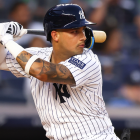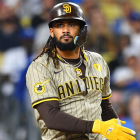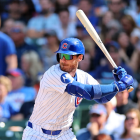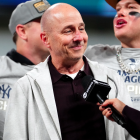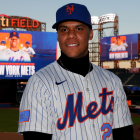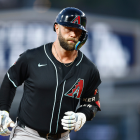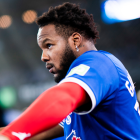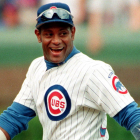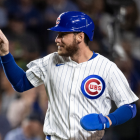
Even without the benefit of hindsight, Michael Busch's inclusion in Thursday's trade between the Los Angeles Dodgers and the Chicago Cubs felt inevitable. Busch, a skilled left-handed hitter with ample Triple-A success, had the misfortune of being stuck in the same organization that just signed Shohei Ohtani to a decade-long deal. Unfortunately for Busch, he doesn't offer much value defensively. The Dodgers have tried him all over the diamond without finding a successful home, leaving him in an awkward spot: he was too good to remain in Triple-A, but he had no clear role in the Dodgers' plans.
The concept of a blocked prospect is often overapplied. When it comes down to it, teams will almost always find a spot for a compelling young player. That might entail asking someone to change a position, or, in this day and age when the value of cost- and team-controlled seasons are understood by front offices and fans alike, it might mean trading an entrenched veteran. Busch, though, is evidence such a thing as a blocked prospect does still exist.
As such, we here at CBS Sports wanted to celebrate Busch getting an opportunity elsewhere by highlighting four other MLB prospects who would benefit from a similar change of scenery. That doesn't mean these players will be traded, just that a deal would improve their chances of becoming a regular.
You'll note that all four are position prospects -- that's by design, since it's always easier to carry a pitcher on a roster. (We request that you also note the players are presented in no particular order.)
1. Joey Ortiz, SS, Orioles
One front office source joked that this list could be composed of just Orioles prospects. It's true. The Orioles have an abundance of young position players climbing the organizational depth chart. They have only so many roster spots and at-bats to hand out, however, and they're nearing that gray area between bletting and wasting. We suspect that sooner or later they're going to consolidate some of that excess into an impact big-league player.
If that happens -- when that happens -- it shouldn't surprise anyone if Ortiz is part of the outgoing package. That's no knock against him. The Orioles just have more than their fair share of talented young shortstops, ranging from Gunnar Henderson to Jackson Holliday. Ortiz is expendable as a result. Given the barren state of the free-agent and trade markets for shortstops, we have to believe that whatever team lands him will be thrilled with the outcome.
Ortiz is a talented defender capable of pulling off web gems. The Orioles primarily deployed him at second base during his big-league stay, but there's no doubt he's capable of manning the six. He didn't show much offensively during that 15-game stretch, yet his performance in Triple-A suggests he has something to offer at the dish. Indeed, Ortiz hit more than 45% of his batted balls over 95 mph. Although he's never going to be a big home-run hitter -- his average launch angle was 8.5 degrees -- he should be able to collect enough hits and walks to avoid being viewed as the modern Jack Wilson.
That's a good player on paper. Here's hoping Ortiz finds a situation where he can prove as much on the field.
2. Justin Foscue, 2B/3B, Rangers
The Rangers liked Foscue enough to draft him 14th overall in 2020. Through little fault of his own, he's since become an expendable piece of their franchise.
Corey Seager and Marcus Semien have grips on the middle-infield spots. Another former first-round pick, Josh Jung, took third base as his own in 2023. Don't think about him moving to the corner outfield, either -- not with Evan Carter and Wyatt Langford both looking like long-term fixtures. Maybe Foscue and Ezequiel Durán can form a support group for overqualified reserves?
Justin Foscue for 2!
— Minor League Baseball (@MiLB) March 13, 2023
The @Rangers’ No. 7 prospect sends one to the berm: pic.twitter.com/l2Hl0aghck
Anyway, Foscue spent last season in Triple-A, where he hit .266/.394/.468 with more walks than strikeouts. He has a patient approach and he connected on more than 90% of his in-zone swings. The pull-happy Foscue launched 18 home runs, too, but his ball-tracking data isn't as impressive when it comes to feats of strength. His average exit velocity was 89.2 mph and he cleared the 110 mph mark just once…and that's if you're generous and round up.
Foscue has a history of playing second and third base, but he's not much of a defender. Whomever he ends up with will have to pick between living with suboptimal defense at a skill position or lackluster power at a non-skill position. Even so, his contact and on-base chops are appreciable and they should give him a big-league life sooner than later.
3. Edwin Arroyo, SS, Reds
We've long been fans of Arroyo, down to overrating him during his draft year. The Reds are one of the few teams who can compete with the Orioles when it comes to sheer infield depth, however, and someone will have to go at some point. Maybe it won't be Arroyo; maybe it'll be Noelvi Marte (another player we've been sweeter on than the consensus) or Matt McLain. It probably won't be Elly De La Cruz, lest the Reds give up on him too quickly.
For our purposes, we elected to name Arroyo. Feel free to mentally slot in whomever you think is likeliest to depart. It won't hurt our feelings.
The switch-hitting Arroyo spent most of 2023 in Double-A, batting .248/.321/.427 with 13 home runs and 28 stolen bases. Those marks may not appear impressive at face value, but they were better than the league-average and they were produced by a solid defensive shortstop who celebrated his 20th birthday in August. All together, that kind of performance bodes well for his chances of having a big-league career.
As with Ortiz, the slim pickings out there at shortstop might even inspire a team to value Arroyo a little more than they would otherwise.
4. Everson Pereira, OF, Yankees
Pereira was one of two notable young outfielders to debut for the Yankees last season. (You may have heard of the other.) He might not have been greeted with the same level of fan fare as his substantively more famous peer, but he's an intriguing prospect. Alas, he might have a fatal flaw.
First, the good. As we noted when Pereira received the call, he's capable of hitting the ball with authority. To quote ourselves: "Pereira has an average exit velocity of 92.8 mph and launch angle of 11.3 degrees. Those marks would put him in the neighborhood of the likes of Gunnar Henderson, Fernando Tatis Jr., and Randy Arozarena at the big-league level." That Pereira also swiped 15 bases last year gives him a dynamic offensive ceiling.
First hit in the majors for Pereira 👊
— New York Yankees (@Yankees) August 24, 2023
Congratulations Everson! pic.twitter.com/xQsDewP9GU
The problem here is the floor. Pereira swings and misses a lot -- and we do mean a lot. His overall whiff rate on non-fastballs last season was over 50%. Only one qualified big-league hitter posted a mark higher than 46% in that category last season: Oakland Athletics outfielder Brent Rooker.
During Pereira's admittedly brief big-league stay, he connected on just 57% of his swings, with a 66.2% zone contact rate that was nearly 16 percentage points below the league-average mark. Teams are willing to overlook swing-and-miss tendencies more now than ever before, but there's a baseline amount of contact that a player must make to function in the majors. Pereira is a legitimate candidate to fall on the shady side of it.
Pereira is only 22 and with this kind of upside you can understand being patient with him. Unfortunately, he seems certain to enter the 2025 season without any remaining minor-league options. The Yankees, who spent the first half of the winter picking up left-handed-hitting outfielders, have incentive to move him before next winter. Rebuilding teams, meanwhile, might be willing to overlook the downside for a chance to unlock Pereira's upside.








